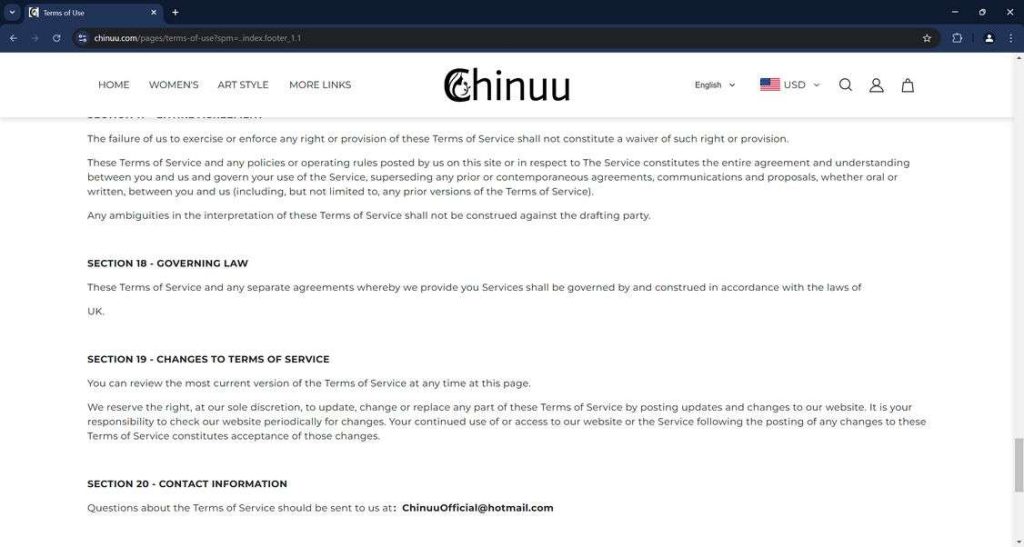Key Points:
- Chinuu.com is a scam website posing as an online retailer.
- They lure customers with huge discounts and fake product images.
- Buyers often receive nothing or low-quality counterfeit goods.
- The site collects sensitive personal information for fraudulent purposes.
- This scam is part of a larger network that repeatedly rebrands and targets new victims.
Scam Overview
Chinuu.com presents itself as a legitimate online store offering products at heavily discounted prices. However, this is nothing more than a ploy to trick customers into placing orders and sharing their payment details. Instead of delivering the promised items, the scammers behind Chinuu.com either send worthless knock-offs or simply vanish after taking your money. Additionally, the site collects personal information that may be used for identity theft or other malicious purposes.
Scammers rely on social media advertising and spam emails to lure in unsuspecting shoppers. The deals appear too good to pass up, which is exactly what they want you to think.
How the Chinuu.com Scam Works
- Aggressive Social Media Ads
- Chinuu.com uses targeted ads on platforms like Facebook, Instagram, and TikTok.
- Ads feature slogans such as “Warehouse Clearance” or “Limited Time Deals” to create urgency.
- A Convincing Storefront
- The website mimics the design of genuine e-commerce stores.
- Fake reviews, countdown timers, and stolen product images add to the illusion of legitimacy.
- Fake Order Confirmations
- After placing an order, buyers receive a confirmation email, reassuring them that everything is in order.
- This is often the last communication buyers receive.
- No Deliveries or Counterfeit Products
- Most customers never receive their orders.
- Those who do often report receiving incorrect or low-quality items, such as cheap trinkets instead of the advertised products.
- No Refunds or Support
- Attempts to contact the site for refunds or support are ignored.
- The scammers frequently shut down the site and reopen under a different name once complaints pile up.
- Rebranding and Repeating
- Once exposed, the scammers rebrand and launch a new website, repeating the same scheme with new unsuspecting victims.
Red Flags at Chinuu.com
- Suspicious Discounts: Offering up to 90% off on products is a classic bait tactic.
- No Contact Information: Legitimate businesses provide clear contact details, but Chinuu.com does not.
- Anonymous Ownership: There is no information about who runs the site.
- Copied Content: The website’s product descriptions, images, and legal pages are plagiarized from legitimate retailers.
- No Social Media Presence: Genuine brands maintain social media profiles to engage with customers.
How to Spot Scam Websites
- Check Domain and Contact Details
- Look for odd domain names or spelling errors.
- Verify if the company provides a physical address and working customer support.
- Beware of Unrealistic Deals
- If a deal looks too good to be true, it probably is. Legitimate businesses cannot sustain such extreme markdowns.
- Search for Reviews
- Check reviews on independent platforms like TrustPilot or the Better Business Bureau (BBB).
- Inspect Site Security
- Ensure the site uses SSL encryption (look for HTTPS in the URL).
- Avoid sites that only accept irreversible payment methods like wire transfers or cryptocurrency.
- Analyze Content Quality
- Scam sites often have poor grammar and generic product descriptions.
- Check if product photos appear elsewhere using a reverse image search.
Spotting Social Media Scams
On Facebook:
- Watch for ads with outrageous discounts and generic stock images.
- Check the page creation date. Newly created pages are often a sign of scams.
- Look for inconsistencies in language and spelling.
On Instagram:
- Scam accounts often have few posts and followers.
- Verify the account’s legitimacy by checking user comments and tagged photos.
- Avoid sites that lack secure payment options.
On TikTok:
- Be cautious of videos promoting unbelievably low prices.
- Check for a blue verification badge on seller accounts.
- Avoid sites promoted by accounts with no history of customer interaction.
What to Do If You Fell for the Scam
- Contact Your Bank:
- Report the fraudulent transaction and request a chargeback.
- Keep Records:
- Save all receipts, emails, and screenshots related to your purchase.
- File a Complaint:
- Report the scam to the Federal Trade Commission (FTC) and the Internet Crime Complaint Center (IC3).
- Warn Others:
- Leave reviews on consumer platforms to alert potential victims.
- Report Social Media Ads:
- If you encountered the scam through social media, report the ad or account.
- Check Your Credit Report:
- Monitor your credit report for any suspicious activity and consider placing a credit freeze if necessary.
How to Avoid Online Shopping Scams
- Shop Only from Trusted Sites: Stick to well-known retailers and verify any new ones before making a purchase.
- Check for Secure Payment Options: Use credit cards, as they offer better fraud protection compared to debit cards or wire transfers.
- Read Reviews: Look for reviews outside of the site itself, as scam sites often post fake testimonials.
- Stay Alert for Red Flags: Always be cautious of deals that seem too good to be true, poor website design, and a lack of contact details.
Final Thoughts
Chinuu.com is a scam website designed to exploit unsuspecting shoppers. By luring in victims with unbelievable discounts and fake products, they manage to steal money and personal information without delivering on their promises. Protect yourself by staying vigilant, recognizing red flags, and only shopping from verified online stores. If you’ve already fallen victim to this scam, take immediate action to minimize the damage and report the fraud.
Remember, if a deal seems too good to be true, it likely is. Stay safe while shopping online!




